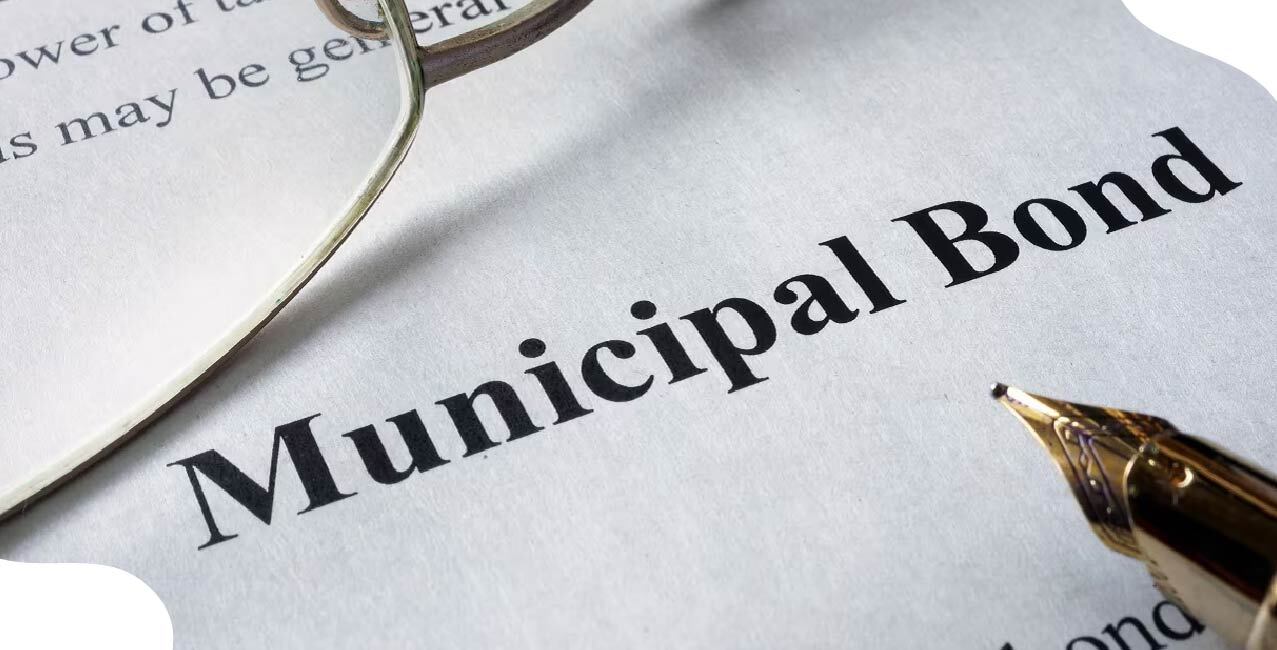
Author
LoansJagat Team
Read Time
5 Min
02 Sep 2025
What are Municipal Bonds – Tax-free Debt Instruments By Local Governments
Key Takeaways:
- Municipal bonds are used by local governments to raise money for public projects like roads, schools, and water systems.
- Investors earn fixed, tax-free interest, making these bonds a safe option for long-term savings and steady income.
- Thanks to fintech platforms, investing in municipal bonds is now simple, quick, and can be done completely online.
- By investing in municipal bonds, people not only grow their money but also support the development of their own cities.
BONUS: NABFID WILL INTRODUCE A CREDIT ENHANCEMENT PRODUCT WITHIN FOUR MONTHS TO BOOST LOW-RATED MUNICIPAL BONDS AND SUPPORT INFRASTRUCTURE FUNDING FOR 500 MUNICIPAL BODIES.
A municipal bond is a debt security issued by local governments, cities, or municipalities to raise money for public projects. In this, investors lend money to the issuer and get interest payments, often tax-free.
Ravi Sharma, a 40-year-old IT manager, invested ₹5,00,000 in a municipal bond issued by his city’s municipal corporation for building a new water treatment plant. The bond offered 6% annual interest, paid tax-free. Every year, Ravi received ₹30,000 in interest without any tax deductions. Over 5 years, he earned ₹1,50,000 in interest, plus got his ₹5,00,000 back at maturity. This gave him a steady income while supporting a public project.
In this blog, you will learn how municipal bonds work, their benefits, risks, types, recent market updates, and why they matter.
How Municipal Bonds Work?
Municipal bonds are issued by local governments to collect money for big public projects like roads, water supply, or schools. The government borrows money from investors and promises to give it back with interest on fixed dates.
For example, Anita Mehra bought a 5-year bond from her city’s municipal corporation. She invested ₹5,00,000. Every year, she receives interest directly into her bank account. After 5 years, she gets her full ₹5,00,000 back along with the total interest she earned.
The table below shows how money moves in a municipal bond from start to end:
This flow shows that municipal bonds are a simple give-and-take process; the city gets funds for projects, and the investor gets steady income and principal back.
Types of Municipal Bonds in India
There are four main types of municipal bonds in India. Each type is made for a special purpose and has different rules for repayment and tax.
- General Obligation Bonds: These are backed by the general income of the government, like taxes. They are used for many kinds of projects and are usually very safe.
- Revenue Bonds: These are paid back using the income from the specific project they were made for. For example, money from tolls or water bills.
- Tax-free Bonds: The interest from these bonds is not taxed, so investors keep the full amount they earn.
- Green Bonds: These bonds are used to support projects that help the environment, such as solar power plants or waste recycling centres.
For example, Karan Patel invested in a green bond to support solar energy in his city. He felt happy because his money earned returns and also helped the environment.
Here’s a comparison of the different municipal bond types:
This comparison makes it easy to choose the right municipal bond based on safety, purpose, and tax benefits.
Key Features of Municipal Bonds
Municipal bonds have some strong features that make them popular with investors. These features help investors get a steady income and tax savings:
- Fixed income: Investors get the same interest rate for the whole bond period. This gives regular and predictable income, which makes planning easier.
- Tax-free interest: Some municipal bonds do not charge income tax on the interest. This means the investor can keep the full amount earned without deductions.
- Long-term investment: These bonds often have a long maturity period, like 5 to 10 years, making them good for future goals such as children’s education or retirement.
These features give investors both financial security and a clear path to long-term goals.
For example, Meera Joshi invested ₹3,00,000 in a tax-free municipal bond. Every year, she gets a steady amount credited to her account without paying any tax on it.
The table below connects each feature to its main benefit for investors:
It helps investors to understand exactly why these bonds fit their needs.
Benefits of Municipal Bonds in Fintech
Municipal bonds are becoming easier to buy and manage because of fintech platforms. These platforms let people invest without long paperwork or visiting offices. Digital systems also make tracking payments and maturity dates simple.
- Easy access: Many fintech apps allow bond purchases in just a few clicks. This helps even small investors join the market.
- Quick KYC: Online KYC checks save time and make investing faster.
- Better transparency: Investors can see all details, like interest rates and payment schedules, in one place.
Fintech tools make investing in municipal bonds faster, simpler, and more transparent for everyone.
For example, Raj Malhotra invested ₹2,00,000 in a municipal bond through a fintech app. He received updates on interest payments directly on his phone.
The table below shows how fintech improves the municipal bond investment process:
This shows how fintech has changed municipal bond investing from a slow, offline process to a quick, digital experience.
Risks of Municipal Bonds
While municipal bonds are mostly safe, they still carry some risks that investors should understand before putting in money. These risks can affect how much you earn and when you get your money back.
- Default risk: If the municipal corporation cannot repay the loan, investors may lose some or all of their money.
- Interest rate risk: If interest rates in the market go up, existing bonds may become less attractive, reducing their resale value.
- Liquidity risk: Municipal bonds may not be easy to sell quickly, especially in a weak market.
Knowing these risks helps investors make better decisions and avoid unpleasant surprises.
For example, Pooja Nair bought a municipal bond worth ₹1,50,000. When she needed money urgently, she had to sell it at a lower price because there were few buyers.
How to Invest in Municipal Bonds in India?
Buying municipal bonds in India has become simple with stock exchanges, RBI platforms, and fintech apps. Still, investors must follow certain steps to make the process smooth.
For example, Arjun Verma invested ₹1,00,000 in a municipal bond using the NSE online platform. He completed his KYC in minutes and bought the bond the same day.
The table below lists the main steps to invest in municipal bonds:
This step-by-step process ensures that even first-time investors can buy municipal bonds with confidence.
Tax Advantages of Municipal Bonds
One of the biggest reasons people choose municipal bonds is the tax benefit. The interest from certain municipal bonds is completely tax-free under the Income Tax Act. This means you get to keep the full interest amount without deductions.
- No tax on interest: Investors save more compared to taxable fixed deposits.
- Better post-tax returns: Even if the interest rate is slightly lower, the final income can be higher because it’s tax-free.
- Ideal for high-income earners: Saves more money for those in higher tax slabs.
These tax benefits make municipal bonds especially attractive for people looking to keep more of what they earn.
For example, Nikita Kapoor invested ₹4,00,000 in a tax-free municipal bond. She earned ₹28,000 in a year and paid no tax on it, saving more compared to her old bank deposit.
The table below shows the difference between taxable and tax-free investments:
This clearly shows how tax-free bonds can give higher final returns compared to taxable investments.
Conclusion
Municipal bonds are a safe and tax-friendly way to invest, especially now that fintech has made them easy to buy and track. They help local governments raise funds for public projects and give investors steady returns.
From fixed income and tax savings to supporting city development, municipal bonds offer multiple benefits. But investors must still check the bond’s safety and be aware of risks before investing.
FAQs
How do credit ratings affect investor confidence in municipal bonds issued by local governments?
Higher credit ratings improve trust and reduce interest costs, while lower ratings may lead to limited investor participation.
Can municipal bonds be traded on stock exchanges like other government securities?
Yes, many municipal bonds are listed on stock exchanges, making them tradable and offering liquidity to investors.
Do tax-free municipal bonds always offer better post-tax returns than taxable bonds?
Not always, returns depend on your tax bracket, bond yield, and market risk, making comparison essential before investing.
Are municipal bonds backed by state governments or are they purely local liabilities?
Municipal bonds are typically obligations of the local bodies and not guaranteed by state governments unless explicitly stated.
How do project-specific municipal bonds differ from general-purpose municipal bonds in terms of risk?
Project-specific bonds carry higher risk if the project fails to generate returns, unlike general-purpose bonds backed by broader revenues.
Other Related Pages | |||
Pros and Cons of Taking a Personal Loan for Crypto Investment | |||
About the Author

LoansJagat Team
‘Simplify Finance for Everyone.’ This is the common goal of our team, as we try to explain any topic with relatable examples. From personal to business finance, managing EMIs to becoming debt-free, we do extensive research on each and every parameter, so you don’t have to. Scroll up and have a look at what 15+ years of experience in the BFSI sector looks like.

Quick Apply Loan
Subscribe Now


